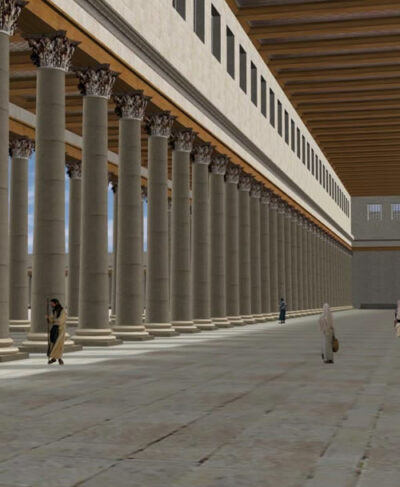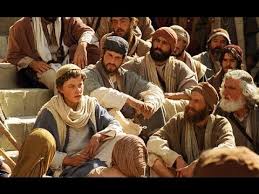Bu – The New Freedom in Messiah 6: 12-14
The New Freedom in Messiah
6: 12-14
The new freedom in Messiah DIG: Is Paul talking about individual sins or our [sin nature]? In what sense are believers under subjection grace? What is the difference between the yoke of Messiah and the yoke of legalism? What is the purpose of the Torah?
REFLECT: Now that you are saved, how do you see things differently? Do you feel like you are under bondage? How free are you? What does “offering your body as a living sacrifice” mean to you? Who do you know that lives under bondage that you could help this week?
We should offer our bodies as a living sacrifice, set apart for God, and not let our [sin nature] reign as king in our mortal bodies.

We have to live in these mortal bodies the rest of our lives on earth. Just as Yeshua carries scars on His hands (the hand in ancient times was measured from the elbow to the tip of the fingers) and feet, sin, even when confessed and forgiven and cleansed by His blood, often leaves an indelible mark. One day we will look upon Messiah’s scars and realize that we participated in putting them there because of our [sin nature].157
Dear Heavenly Father, How wonderful that You provide the power for us to conquer the [sin nature] in our mortal bodies. I give You great praise that the key to consistent victory is You living within us. Let the word of Messiah dwell in you richly (Colossians 3:15a). As we stay focused on Your love and power, we do not need to worry but rather to pray to You and Your peace will fill us. Do not be anxious about anything – but in everything, by prayer and petition with thanksgiving, let your requests be made known to God. And the Shalom of God, which surpasses all understanding, will guard your hearts and your minds in Messiah Yeshua (Philippians 4:6-7).
Praise You for the great joy to know that You live in all who love and follow You (John 14:16-17, 23). Thank You that You were willing to not only come and suffer a terrible death for our sins (First Peter 3:23) and then go back to heaven (Hebrews 1:3); You also promised to live in and be with those who love You forever (Hebrews 13:5)! I love to meditate on Your word and listen to Your Spirit within me which prepares me to win any temptation battle (Corinthians 10:13). You are wonderful to have within! In Yeshua’s holy name and power of His resurrection. Amen
Therefore, do not let your [sin nature] rule (Greek: basileuo, meaning reign as a king) in your mortal bodies, so that it makes you obey its desires (6:12). The verb is a present imperative with the negative me, which construction forbids the continuance of an action already in motion. So, Paul is saying, “Stop allowing the [sin nature] to reign as king in your mortal body.” The [sin nature] is a dethroned monarch. We have the responsibility of keeping it from mounting the throne of our heart, the place where only the Lord Yeshua should occupy. We are surely able to do this. Our will is free. We have the divine nature and the Ruach Ha’Kodesh to urge us on, and give us the desire and power to refuse the [sin nature] and obey the Word of God. Paul says, “Order your behavior in the sphere of, by means of, the Ruach, and you will not fulfill the desires of the [sin nature].
It is obvious that the [sin nature] can reign as king in our mortal bodies, or else Paul’s warning would be pointless. But it is also obvious that the [sin nature] does not have to reign there, or the warning would be equally pointless. Therefore, he commands: Do not offer any part of yourselves to sin as an instrument for wickedness. On the contrary, yield (Greek: paristemi, means to place beside or near, to present, to put at one’s disposal) yourselves to God as people alive from the dead, and your various parts to God as instruments for righteousness (6:13). Paul does not warn about our [sin nature] reigning in our souls or our spirits, but only reigning in our mortal bodies, because that is the only place in a believer where our [sin nature] can operate.
Paul, later in his letter, laments that it was impossible for him to obey God’s Torah because he had a [sinful nature] that was rebellious. For in my inner self, I delight with God’s Torah; but within me, I see a stubborn “torah,” one that battles with the God’s Torah in my mind and makes me a prisoner of sin’s “torah,” which is operating within me (7:18, 22-23). Here, sin is personified as having, so to speak, organized its own Mount Sinai, and there, given its own “torah” which we find ourselves devotedly obeying as a result of our old [sin nature].158 He then concludes: What a miserable creature I am! Who will rescue me from this this wrestling match, this body bound for death? Thanks be to God [He will]! – through Yeshua the Messiah, our Lord! To sum it up: with my mind, I am a slave of God’s Torah; but with my old [sin nature], I am a slave of sin’s law (7:24-25).
Dear Wonderful Heavenly Father, Praise You for the glorious riches of the mystery that was hidden for ages and generations, but now has been revealed to His holy ones. God chose to make known to them this glorious mystery regarding the Gentiles – which is Messiah in you, the hope of glory! (Colossians 1:26-27). How fantastic that Messiah lives in all, Jew and Gentile, who love and follow Him
It is so wonderful to be “In Messiah,” which gives us power over our [sinful nature] now, and for eternity it guarantees our inheritance of living in heaven with God, our Holy Father. Praise You that before the creation of the world You decided to choose to put “Messiah in” all who would love and follow You as their Lord and Savior. He chose us in the Messiah before the foundation of the world, to be holy and blameless before Him in love . . . In Him we also were chosen (Ephesian 1:4 and 11a). Praise You that our redemption is not by anything we could do, but is “In Messiah”. In Him we have redemption through His blood – the removal of trespasses – in keeping with the richness of His grace (Ephesians 1:7, Colossians 1:20-22). Praise You for sealing Your children with the Ruach Ha’Kodesh. After you heard the message of truth – the Good News of your salvation – and when you put your trust in Him, you were sealed with the promised Ruach Ha’Kodesh (Ephesians 1:13).
Praise You not only for the power to conquer our [sinful nature] by our living “In Messiah” but also that enables us to inherit heaven. He is the guarantee of our inheritance, until the redemption of His possession – to His glorious praise (Ephesians 1:14, Philippians 3:9)! I rejoice in Your gracious offer of life for all who love and follow You to live/be “In Messiah,” and I choose to listen to the indwelling Ruach Ha’Kodesh and to put to death my [sinful nature]. In Your Holy Yeshua’s name and power of His resurrection. Amen
Therefore, when Paul says: Do not offer any part of yourselves to sin as an instrument for wickedness (6:13a), it is an offer that is by faith . . . moment by moment. Your body will fight against a righteous walk with YHVH until it is brought into submission to God’s will. This means we have to choose, carefully, what we look at, what (and how) we touch, and what we listen to.159 This is a difficult task in our present society. But we should live our life every day with this in mind. According to Romans 12:1, our bodies should be presented to ADONAI as a sacrifice, living and set apart for God. Sacrifices in the TaNaKh were dead sacrifices. The Lord may ask some of us to die for Him, but He asks all of us to live for Him!160
When we obey the instructions laid down in these verses, Paul says: the [sin nature] will not have authority over you. Since being saved, you now have a choice whether to sin or not because you are not under legalism but under grace (6:14). Paul had gone into detail about this with the believers in Galatia (see the commentary on Galatians, to see link click Bm – The Torah Became our Guardian to Lead Us to Messiah). The word legalism is literally nomos in the Greek text, and is often translated Torah, as in Matthew 5:17. But here, in this context, it must be rendered legalism because no one alive will be considered righteous on the ground of legalistic observance of Torah commands. What Torah really does is show people how sinful they really are (3:20b). The legalistic observance of Torah commands is actually a perversion of the Torah into a system of rules for earning God’s praise without trusting in YHVH, the giver of the Torah.
Under legalism . . . under grace. The word twice translated under (Greek: upo) means controlled by or in subjection to, and opens the door to a slavery metaphor coming up next (see Bv – The New Master in Messiah). But what sense are we in subjection to grace? In the sense that we have accepted Yeshua’s yoke, which is easy and light to be under (see the commentary on The Life of Christ Ee – Come to Me, All Who are Weary and Burdened, and I Will Give You Rest), in contrast with the yoke of legalism, which is not. As Paul himself said at the Jerusalem Counsel: Why do you challenge Gentile salvation and put God to the test by putting a yoke on the neck of the [Gentile] disciples – which neither our fathers nor we have been able to bear (15:10)? Being under grace, is a subjection which, because of the very nature of grace itself, does not have the usual oppressive characteristics of subjection.
Since the Torah was never intended to be a means of salvation, but as our blueprint for living (see the commentary on Deuteronomy Bk – The Ten Words), we are never to live in subjection to legalism. ADONAI’s children, the people who are in a faith relationship with Him, are, and always have been, under grace.161












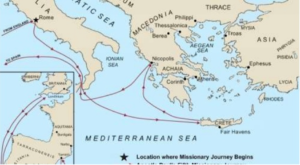
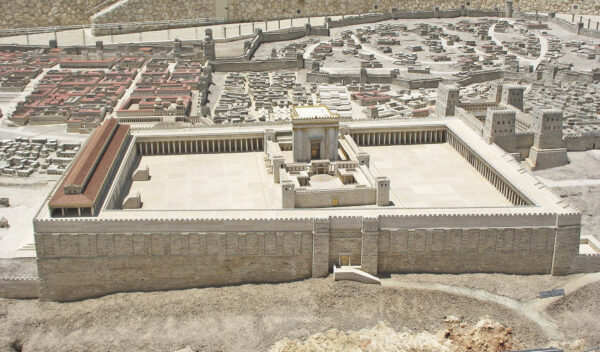
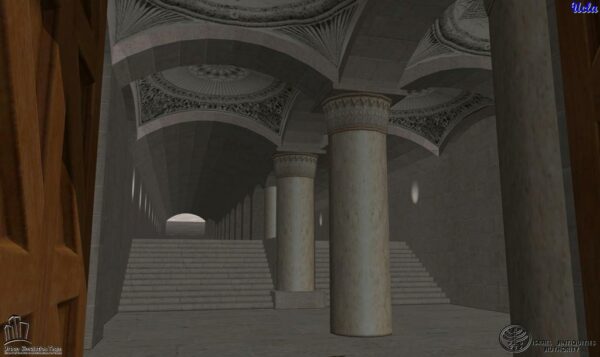
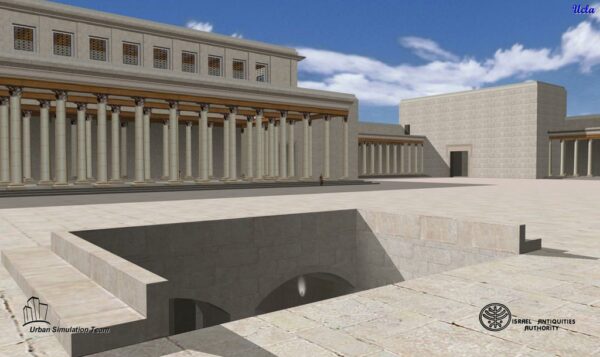
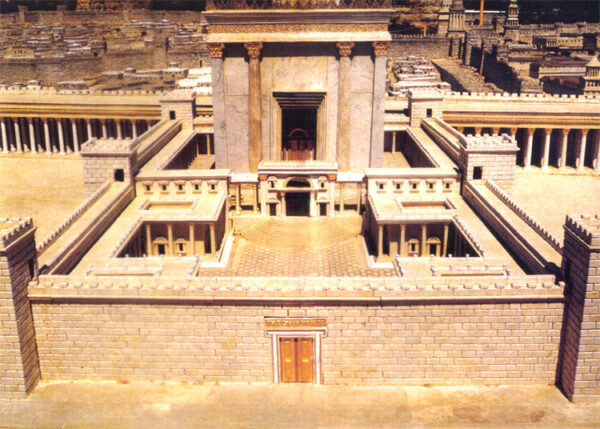
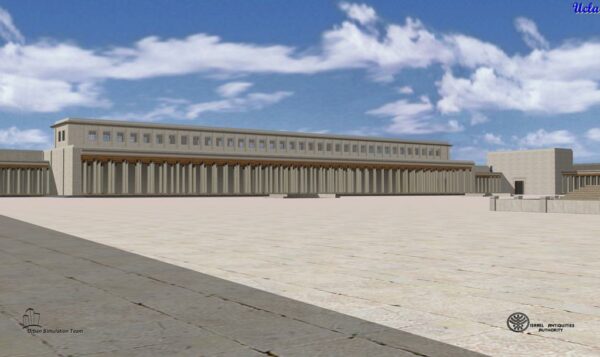 இது ஒரு பெரிய திறந்தவெளி பிளாசாவாக இருந்தது, அது முழு தெற்கு சுவரின் நீளத்தையும் ஓடியது. இது பசிலிக்கா அல்லது பண்டைய ரோமில் ஒரு பெரிய கட்டமைப்பின் திட்டத்தின் படி கட்டப்பட்டது. வடிவமைப்பில் செவ்வக, இது ஒவ்வொரு முனையிலும் போர்டிகோஸிலிருந்து நுழைந்த கூரை மண்டபத்தைக் கொண்டிருந்தது. இது ஒரு பரந்த மத்திய இடைகழி அல்லது நேவைக் கொண்டிருந்தது, மேலும்
இது ஒரு பெரிய திறந்தவெளி பிளாசாவாக இருந்தது, அது முழு தெற்கு சுவரின் நீளத்தையும் ஓடியது. இது பசிலிக்கா அல்லது பண்டைய ரோமில் ஒரு பெரிய கட்டமைப்பின் திட்டத்தின் படி கட்டப்பட்டது. வடிவமைப்பில் செவ்வக, இது ஒவ்வொரு முனையிலும் போர்டிகோஸிலிருந்து நுழைந்த கூரை மண்டபத்தைக் கொண்டிருந்தது. இது ஒரு பரந்த மத்திய இடைகழி அல்லது நேவைக் கொண்டிருந்தது, மேலும்